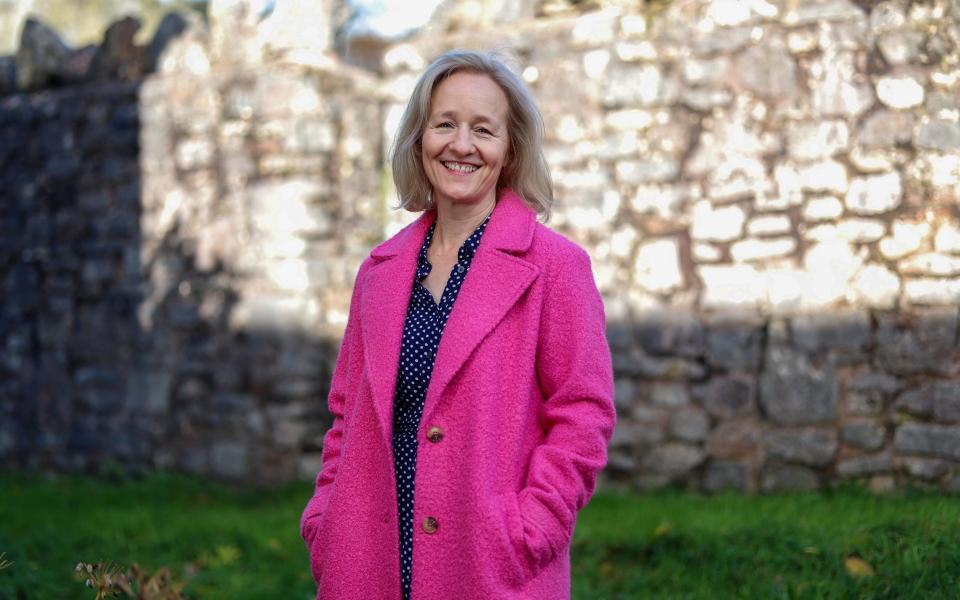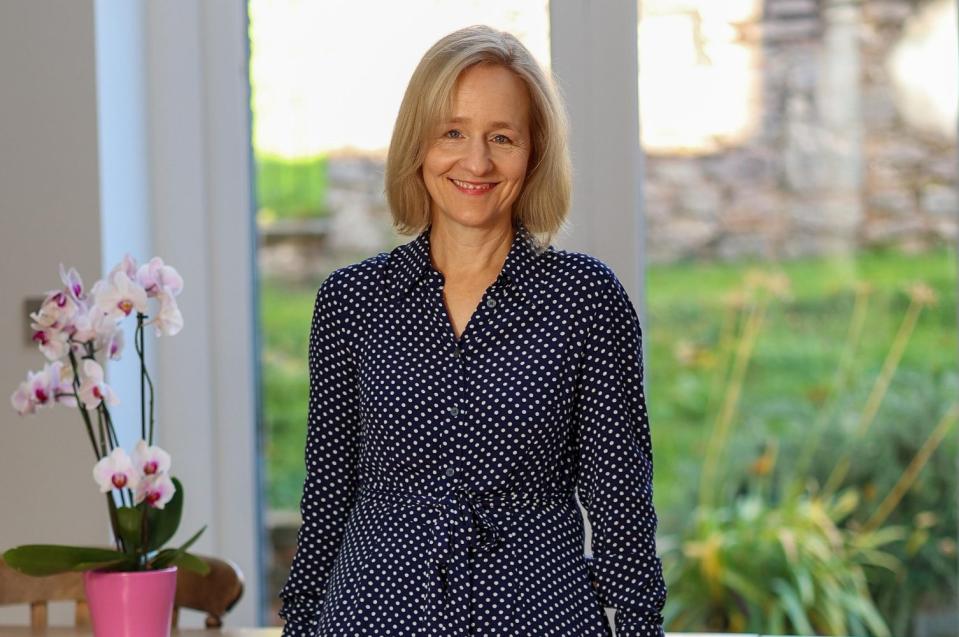Questions to ask your doctor about HRT

- Oops!Something went wrong.Please try again later.
They call it “the Davina effect”. Campaigns led by hormone replacement therapy (HRT) enthusiasts such as Davina McCall and Mariella Frostrup have led to a boom in demand. The number of women being prescribed HRT in England has risen by almost 30 per cent over just the last year, from 1.8 million in 2021 to 2022, to 2.3 million from 2021 to 2023 – and has doubled since 2015. New NHS figures also reveal that from 2022 to 2023, women were prescribed 11 million separate HRT medications, a rise of 47 per cent on the previous year.
And thanks to campaigning, women can cut the cost of HRT by buying an HRT pre-payment certificate in England, entitling them to an annual supply of HRT for £19.30, no matter how many individual items they need.
So, if you are considering joining the hormone rush, here are some questions you might want to consider.
How should I broach the subject with my doctor?
Dr Juliet Balfour is a GP who runs an NHS menopause service in Somerset. She suggests you save time by being direct, saying something like, “I might be experiencing menopausal symptoms. Can we discuss the option of HRT?”
She says: “It can be useful to fill in a menopause symptom checker before your appointment. They are available on the internet. Or write down a list of things that are bothering you.” She adds: “You can have a menopause consultation over the phone and it is helpful to have a recent blood pressure reading plus your weight and height.”
How long should you try before realising you need a different dose or combination?
“We start HRT at a low dose for three months and then see what’s happening to symptoms,” says Dr Balfour. “There’s often a lot of tweaking” to find the best dose and product for you.
Dr Paula Briggs is a consultant in sexual and reproductive health, based at Liverpool Women’s NHS Foundation Trust, and she is chair of the British Menopause Society. She warns against women self-medicating by using more oestrogen gel than they have been prescribed or wearing extra patches. “They think it will make them feel better,” she says. “But we cannot guarantee that it’s safe.” Studies show that too high oestrogen levels can cause side effects including nausea, headaches, weight gain, hair loss, breakthrough bleeding and even high blood pressure and an increased risk of breast and cervical cancer.
Do I have to wait for the menopause before I can have HRT?
“The normal range for a last period is between the ages of 45 and 55,” says Dr Balfour. Because perimenopause, the period of hormone changes leading up to menopause, can last ten years, some women in their thirties and forties will experience symptoms, and could benefit from HRT.

The 2023 Practitioner’s Toolkit for Managing Menopause has been created and endorsed by global menopause experts including the British Menopause Society and offers guidelines for treating menopause. It states that perimenopausal symptoms suggesting low oestrogen, such as hot flushes and vaginal dryness, are considered indications for HRT.
What should I do if my doctor says “no”?
“If you’ve been refused and aren’t happy, you can hopefully find someone else in the practice who can help you,” says Dr Balfour. “Ask the receptionist if there is anyone who has a particular interest in women’s health or menopause training. If you are really struggling, ask for a referral to an NHS specialist menopause clinic.” You might also consider going private. You can find your nearest specialist clinic via the British Menopause Society’s website, thebms.org.uk.
The toolkit states that doctors should be cautious about prescribing HRT to “women with high risk of VTE (venous thromboembolism or blood clots) or breast cancer, untreated cardiovascular disease, undiagnosed vaginal bleeding, active liver disease and migraine, notably migraine with aura.” But this doesn’t mean that HRT is always completely out of the question in these cases, though you may need to be seen at a specialist clinic. However, having oestrogen dependent cancer, blood clots, and severe liver disease are usually a no-no for HRT.
Will HRT sort out my anxiety, depression and brain fog?
Dr Balfour says: “Many women develop anxiety and feel low during their menopause transition, and for them HRT is likely to be the first line option to try. However, some women will need antidepressants.”
Dr Briggs says: “There is no evidence to support using high-dose oestrogen to manage significant depression and it could make symptoms worse.” The toolkit states brain fog alone is not a reason to prescribe HRT as studies have not shown it helps more than a placebo.
What are the different ways to take HRT?
The safest way to take oestrogen is through the skin, via a gel, patch or spray as, unlike tablets, these don’t raise the risk of blood clots. However, “tablets can be an option for younger women with no risk for blood clots,” says Dr Balfour. “But they will need to switch to transdermal oestrogen by 60 at the latest.”
If you haven’t had a hysterectomy, you will need to use a progestogen to prevent the womb lining becoming too thick, which is a risk factor for uterine cancer. Dr Balfour often recommends micronized natural progesterone in the form of a tablet called Utrogestan, but says for younger women who still need contraception, the Mirena coil, which delivers progestogen directly to the womb, is a “brilliant option”. Combined patches containing both oestrogen and progestogen are another convenient option as they only need to be applied twice a week. Most women who have had a hysterectomy only need oestrogen.
What about the risk of breast cancer?
“Combined HRT slightly increases the risk of breast cancer. That’s not something we can ignore,” says Dr Briggs. “However, in most cases, the benefits of HRT outweigh the risks.” Lifestyle factors such as weight management, exercise, reducing alcohol consumption and stopping smoking may help reduce the risk of developing breast cancer.
Do all women need HRT?
“Menopause is a life stage, and women should be able to choose how they manage this life stage,” says Dr Briggs. “Nobody should feel that they must take HRT.”

However, Dr Balfour says that women who go through menopause before the age of 45, and especially before the age of 40, are at higher risk of cardiovascular disease and osteoporosis if they don’t take HRT until at least the average age of menopause which is 51. “They have no increased risk of breast cancer above their background risk during this time.”
Do you have to stay on HRT forever?
“Absolutely not,” says Dr Balfour. “But if you feel well on it, you can carry on as long as you want.” Though she says that all women need to have an annual review to ensure the benefits still outweigh the risks.
“Women tend to need a reduced dose as they get older but even small doses of oestrogen are proven to protect bones,” she says. It’s a myth that HRT simply delays menopause until you stop taking it.
Is it ever too late to start HRT?
“Ideally, you’d start HRT within ten years of your last period due to the cardiovascular benefits,” says Dr Balfour. “However, some women still get hot flushes twenty years after the menopause. It’s an individual discussion, but generally starting it much later tends to offer fewer benefits.”
If I can’t or don’t want to take HRT, are there any alternatives?
“There are non-hormonal options which can help women manage menopausal symptoms, most commonly flushes and sweats, difficulty sleeping and mood related symptoms,” says Dr Briggs. “The drugs that we use most often are venlafaxine slow release and mirtazapine, both in a low dose.
“These medications are licensed to treat depression, but can have a beneficial effect on menopausal symptoms. The other drug commonly used outside of licence in an ultra-low dose is oxybutynin, for hot flushes.
“There is a new group of drugs coming to market very soon that are non-hormonal and will be licensed to treat hot flushes and night sweats – the neurokinin antagonists. We are hoping that fezolinetant will become available in the UK early next year,” she says.
Local oestrogen in the form of creams, gels, vaginal rings, tablets or pessaries can treat vaginal symptoms such as dryness, itching, and soreness, plus they can stop urinary tract infections and improve symptoms like needing the loo frequently. You can buy one product, Gina10 microgram vaginal tablets, over the counter in pharmacies without a prescription.
A new study has shown that vaginal oestrogen doesn’t increase the risk of breast cancer, even in women who have had the disease and are taking oestrogen suppressing medication in the form of aromatase inhibitors. “Most older women will benefit from using local oestrogen,” says Dr Balfour.
Recommended
My struggle to get through horrendous hot flushes without HRT

